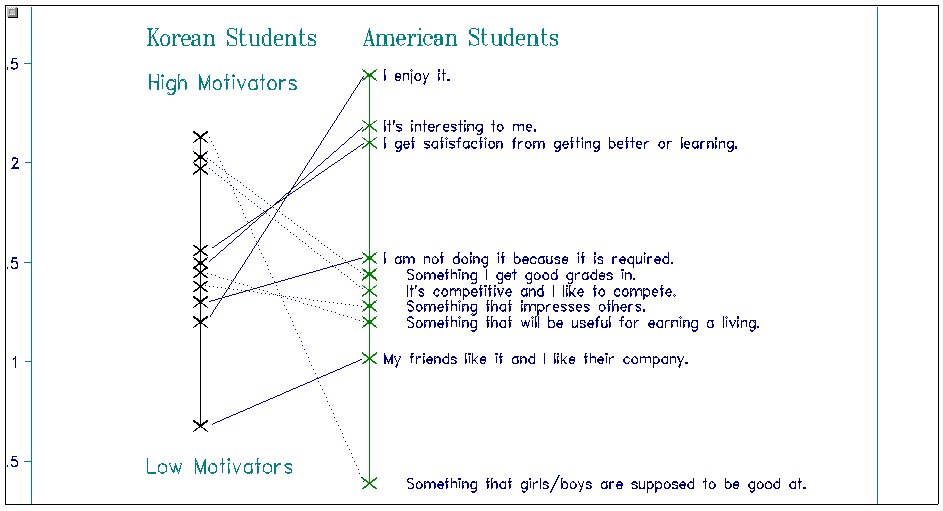
Alternative construct definitions, often encountered as differential item functioning, are generally regarded as undesirable. But different use of items provides insight into how groups differ. For instance, how different are academic motivations between talented American and Korean high school students?
Rasch analysis of a students' motivation questionnaire (Csikszentmihalyi, 1993: revised by Choe, 1995) provides an answer. The two columns on the item map (see Figure) represent Rasch calibrations of equivalent American and Korean motivation items.

Academic motivations can be classified into two categories, "intrinsic" and "extrinsic", based on the rewards which students hope to get. Intrinsically-motivated students find academic activities enjoyable, interesting and challenging, while extrinsically-motivated students are more driven by the consequences or outcomes of academic activities rather than by study itself. Extrinsic motivation can be further divided into "social" and "material". Material motivations include good grades, future education or job security. Social motivations include approval of parents, teachers and friends.
Look at the American item hierarchy. At the top, American students are motivated by what they enjoy, are interested in or obtain satisfaction from. They are less motivated by the thought of future benefits or becoming good children. Talented American students are intrinsically motivated.
The Korean hierarchy is in stark contrast. Korean students value living up to parental expectations. They are also motivated by material concerns such as job prospects. They are extrinsically motivated.
In retrospect, these findings are obvious! Korean parents and students believe that education is the avenue to higher social status. Korean students are taught Confucian values: respect, social obligation and trust in human relationships. Nevertheless, it requires a simple depiction, such as this item map, to bring into an objective perspective the different natures of these two societies. Lucid exposition of contrasting empirical definitions of the same construct, "academic motivation", opens the door to intra-cultural understanding and cooperation.
Csikszentmihalyi, M. et al. (1993) Talented teenagers. Cambridge: Cambridge University Press.
Choe, In-Soo (1995) Motivation, Subjective Experience, Family and Academic Achievement in Korean High School Students (Ph.D. dissertation, University of Chicago)
Learning from construct definitions. Choe I. … Rasch Measurement Transactions, 1995, 9:3 p.439
| Forum | Rasch Measurement Forum to discuss any Rasch-related topic |
Go to Top of Page
Go to index of all Rasch Measurement Transactions
AERA members: Join the Rasch Measurement SIG and receive the printed version of RMT
Some back issues of RMT are available as bound volumes
Subscribe to Journal of Applied Measurement
Go to Institute for Objective Measurement Home Page. The Rasch Measurement SIG (AERA) thanks the Institute for Objective Measurement for inviting the publication of Rasch Measurement Transactions on the Institute's website, www.rasch.org.
| Coming Rasch-related Events | |
|---|---|
| Jan. 16 - Feb. 13, 2025, Fri.-Fri. | On-line workshop: Rasch Measurement - Core Topics (E. Smith, Winsteps), www.statistics.com |
| Apr. 8 - Apr. 11, 2026, Wed.-Sat. | National Council for Measurement in Education - Los Angeles, CA, ncme.org/events/2026-annual-meeting |
| Apr. 8 - Apr. 12, 2026, Wed.-Sun. | American Educational Research Association - Los Angeles, CA, www.aera.net/AERA2026 |
| May. 15 - June 12, 2026, Fri.-Fri. | On-line workshop: Rasch Measurement - Core Topics (E. Smith, Winsteps), www.statistics.com |
| June 19 - July 25, 2026, Fri.-Sat. | On-line workshop: Rasch Measurement - Further Topics (E. Smith, Winsteps), www.statistics.com |
The URL of this page is www.rasch.org/rmt/rmt93a.htm
Website: www.rasch.org/rmt/contents.htm